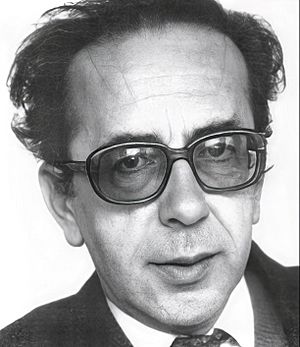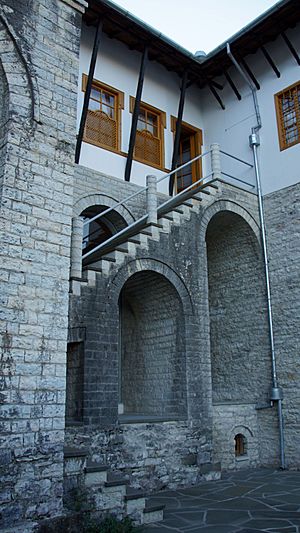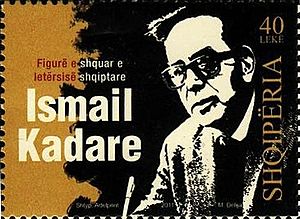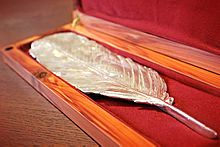Ismail Kadare facts for kids
Quick facts for kids
Ismail Kadare
DFK
|
|
|---|---|

Kadare, c. 1990s
|
|
| Born | 28 January 1936 Gjirokastër, Albanian Kingdom |
| Died | 1 July 2024 (aged 88) Tirana, Albania |
| Occupation | Novelist, poet, essayist, screenwriter, playwright |
| Nationality | Albanian; French |
| Citizenship | Albania |
| Education |
|
| Period | 1954–2024 |
| Genre | Subjective realism, dystopia, satire, parable, myth, fable, folk-tale, allegory, and legend. |
| Subjects | Albanian history, Albanian folk beliefs, Communism, Ottoman Empire, Totalitarianism |
| Notable works |
|
| Notable awards | Prix mondial Cino Del Duca 1992 Man Booker International Prize 2005 Prince of Asturias Award 2009 Jerusalem Prize 2015 Order of Legion of Honour 2016 Park Kyong-ni Prize 2019 Neustadt International Prize for Literature 2020 |
| Spouse | Helena Gushi |
| Children | 2, including Besiana |
| Parents |
|
| Signature | |
Ismail Kadare (born January 28, 1936 – died July 1, 2024) was a very famous writer from Albania. He wrote novels, poems, essays, and plays. He became well-known around the world after his first novel, The General of the Dead Army, was published.
Kadare won many important awards for his writing. These include the Man Booker International Prize in 2005 and the Prince of Asturias Award in 2009. France also honored him with the Legion of Honour in 2016. He was nominated for the Nobel Prize in Literature 15 times!
Many people compare Kadare's writing to famous authors like Franz Kafka and George Orwell. This is because he wrote about how totalitarian governments affect people's lives. Living in Albania under strict rules, Kadare found clever ways to write about difficult topics. He used stories, myths, and legends to share his ideas without getting into trouble with the government.
In 1990, he moved to Paris, France, to escape the strict government in Albania. His books have been translated into 45 languages. In Albania, he was as popular as Mark Twain is in the United States. Almost every home in Albania has one of his books. Kadare is seen as a powerful voice against unfair governments. He was married to author Helena Kadare and was the father of Besiana Kadare, who is an ambassador for Albania at the United Nations. After being unwell for some time, Kadare passed away in Tirana, Albania, on July 1, 2024.
Contents
Early Life and Family
Ismail Kadare was born on January 28, 1936, in Gjirokastër, a historic city in southern Albania. It was a mountain city with tall stone houses. He grew up on a street called "Lunatics' Lane."
His father, Halit Kadare, worked at the post office. His mother, Hatixhe Dobi, was a homemaker. Even though he was born into a Muslim family, Kadare later became an atheist, meaning he did not believe in God.
When Kadare was three years old, Italian soldiers invaded Albania. Later, when he was nine, Albania became a communist country.
He went to school in Gjirokastër. Then, he studied languages and literature at the University of Tirana. In 1956, he became a teacher. He lived in Tirana until 1990, when he moved to France. His old apartment in Tirana is now a museum about his life and work.
Kadare married Albanian author Helena Gushi. They had two daughters. One of their daughters, Besiana Kadare, is now Albania's Ambassador to the United Nations.
Becoming a Writer
First Steps in Literature
When he was 11, Kadare read William Shakespeare's play Macbeth. He loved it so much that he copied parts of it by hand. He felt like he was helping to write the play!
At age 12, he started writing his own short stories. These were published in Pionieri, a children's magazine in Tirana. In 1954, he published his first book of poems, Frymëzime djaloshare (Boyish Inspirations).
When he was 17, Kadare won a poetry contest. This allowed him to travel to Moscow to study at the Maxim Gorky Literature Institute. He learned about a style of writing called Socialist Realism. This style showed communist ideas in an ideal way. But Kadare preferred to write about real life and his own ideas.
He returned to Albania in 1960. For the next 30 years, he lived in Tirana. He worked as a journalist and editor for literary magazines. He also started his own writing career.
Facing Challenges and Finding Success
Kadare became known for his poetry. Young people in Albania especially liked his work. His future wife, Helena, even wrote him a fan letter!
In the 1960s, Kadare wrote a poem called "The Princess Argjiro." It was based on an old Albanian myth. But the government criticized it, saying it had "historical and ideological errors."
In 1962, he published a short story that was part of his first novel. It was quickly banned. This made him known for writing "decadent" (unacceptable) things. Because of this, he didn't publish the full novel until 1990.
In 1963, when he was 26, Kadare published his novel The General of the Dead Army. It was about an Italian general who returns to Albania to find the bodies of soldiers from World War II. This book was different from other Albanian novels at the time. It was darker and didn't praise the Communist revolution. The novel was later made into three films.
By the mid-1960s, the government became even stricter about what writers could publish. In 1967, Albania started its own "Cultural Revolution." Kadare and other writers were sent to live in the countryside for two years. They had to learn about life with peasants and workers.
International Recognition
The General of the Dead Army became Kadare's first big success outside Albania. It was translated into French in 1970. Soon, it was translated into many other European languages. By 1977, it was in over 20 languages!
This success made some older Albanian writers and secret police angry. They called him an "agent of the West." But Kadare continued to publish in Albania and was even promoted as a "hero of the new Albanian literature."
In the 1970s, Kadare started using more myths and legends in his stories. He often used the Ottoman Empire to talk about problems in present-day Albania.
In 1970, he published The Siege, which was popular in Albania and Europe. It was about a war between Albanians and Ottomans. In 1978, he published The Three-Arched Bridge, a story set in the Balkans in 1377. The New York Times called it "strange, vivid, ominous, macabre and wise."
In 1975, Kadare wrote a poem that made fun of the Albanian Communist government. He was almost shot for it! Instead, he was sent to do manual labor in a village for a short time. After returning, he wrote more short novels.
His 1980 novel Broken April was made into a Brazilian film in 2001 called Behind the Sun.
Life in France
In October 1990, Kadare openly criticized the Albanian government. He urged Albania to become more democratic. Because of threats from the secret police, he sought and received political asylum in France. He moved to Paris and lived there, sometimes returning to Tirana.
Living in Paris helped him write even more. He wrote in both Albanian and French. His 1992 novel The Pyramid is a story about building the Great Pyramid of Cheops. In it, Kadare made fun of dictators who love grand, useless projects. He often used the Ottoman Empire in his books to represent a totalitarian state.
His 1996 novel Spiritus was a new kind of story for him. It's about two ghosts returning to a world after communism. It also features a secret listening device used by the secret service.
His 2008 novel The Fall of the Stone City won an award in Kosovo. His semi-autobiographical novel The Doll was published in 2020. It explores his relationship with his mother and his home country.
Since the 1990s, both major political parties in Albania asked Kadare to become President of Albania. But he always said no.
Awards and Honors
Ismail Kadare received many important awards throughout his life.
In 1992, he won the Prix mondial Cino Del Duca in France. In 1996, he became a lifetime member of the Academy of Moral and Political Sciences of France. This is a very respected group of thinkers. He also won the Herder Prize in Austria in 1998.
In 2005, he received the first-ever Man Booker International Prize in the United Kingdom. This award recognized all his literary works. In his speech, Kadare said that writers in Albania helped each other to write good literature, even when the government made it difficult.
In 2009, he won the Prince of Asturias Award for Literature in Spain.
In 2015, Kadare received the Jerusalem Prize in Israel. He spoke about how Albania helped Jewish people during World War II. He said that the number of Jews in Albania actually grew during the war. Albanians refused to hand Jews over to the Nazis and protected many Jewish refugees.
In 2016, Kadare became the first Albanian to receive the Commandeur de la Légion d'Honneur from France. This is a very high honor. That same year, he also received Albania's highest decoration, the National Flag Decoration.
He won the Park Kyong-ni Prize in South Korea in 2019. In 2020, he won the Neustadt International Prize for Literature in the United States. This prize is sometimes called the "American Nobel." In his acceptance speech, he said that literature has no place in a strict Marxist view of the world.
Kadare also received the "Honor of the Nation" Decoration from the President of Albania. He was a member of several academies and received honorary doctorates from universities in France, Kosovo, and Italy.
He was nominated for the Nobel Prize in Literature 15 times. He once joked that people thought he had already won it because it was talked about so much! In 2023, he was granted citizenship of Kosovo.
His Impact on Literature
Ismail Kadare is considered one of the greatest writers of the 20th and 21st centuries. People have compared him to famous authors like Nikolai Gogol, Franz Kafka, George Orwell, and Gabriel García Márquez. Critics called him a "supreme fictional interpreter of the psychology and physiognomy of oppression."
Kadare's writing brought Albanian literature to the world stage. Before him, Albanian literature was not well-known. Through his works, it became read and appreciated globally. He helped Albanian literature become part of wider European and world literature.
Crystal, Ismail Kadare
It's a while since we've seen each other and I feel
As if I'm forgetting you bit by bit,
As the memory of you dies in me -
As hair dies, and all things.
So now I need a point at which
To leave you; I'm hunting high and low
A verse, a note, a jewel
Where I release you, I kiss you, I go.
If no grave will hold you,
Neither marble nor crystal bed,
I don't have to drag you round,
do I, half-alive and half-dead?
If not a dyke to ditch you in,
I'll find a field of flowers and trees
Where, so softly, I will scatter
You, like pollen, upon the breeze.
I'll lull you like this, perhaps, and kiss you
And never return to that setting;
And neither we, nor anyone will know
Whether this was, or was not, the forgetting.
Kadare's work is often seen as a form of resistance. He managed to write great literature in a country that was a strict Communist dictatorship. He had to fight to get his books published, sometimes even risking his life. Speaking out against the government was not allowed in Albania. Kadare said you could be shot for just "a single word" against the regime.
Under the communist leader Hoxha, thousands of people were imprisoned or executed for their words or beliefs. Kadare found many clever ways to trick the government's censors. He used old stories, myths, fables, and legends. He filled them with hidden meanings, jokes, and secret messages.
His writing was always against the official "Socialist Realism" style. He used his own "subjective realism," using allegories, symbols, and historical stories to avoid censorship. The situation in Albania was very strict, similar to North Korea or the Soviet Union under Stalin. Despite this, Kadare used every chance to criticize the government in his books. Educated Albanian readers understood his hidden messages.
His Published Works
Kadare's books have been published in 45 languages. By 2020, most of his nearly 80 novels, plays, screenplays, poems, essays, and story collections had been translated.
Some of his most famous books include The General of the Dead Army (1963), The Siege (1970), Broken April (1980), and The Palace of Dreams (1981).
English Translations
The following novels by Kadare have been translated into English:
- The General of the Dead Army (Albanian: Gjenerali i ushtrisë së vdekur)
- The Siege (Albanian: Kështjella)
- Chronicle in Stone (Albanian: Kronikë në gur)
- Broken April (Albanian: Prilli i thyer)
- The Three-Arched Bridge (Albanian: Ura me tri harqe)
- The Palace of Dreams (Albanian: Pallati i ëndrrave)
- The Concert (Albanian: Koncert në fund të dimrit)
- The File on H (Albanian: Dosja H: roman)
- The Pyramid (Albanian: Piramida)
- Elegy for Kosovo (Albanian: Tri këngë zie për Kosovën)
- Spring Flowers, Spring Frost (Albanian: Lulet e ftohta të marsit)
- The Successor (Albanian: Pasardhësi)
- Agamemnon's Daughter (Albanian: Vajza e Agamemnonit)
- The Blinding Order (Albanian: Qorrfermani)
- The Fall of the Stone City (Albanian: Darka e Gabuar)
- The Accident (Albanian: Aksidenti)
- The Ghost Rider (Albanian: Kush e solli Doruntinën?)
- Twilight of the Eastern Gods (Albanian: Muzgu i perëndive të stepës)
- A Girl in Exile (Albanian: E penguara)
- The Traitor's Niche (Albanian: Kamarja e turpit)
- Essays on World Literature: Aeschylus • Dante • Shakespeare (Albanian: Tri sprova mbi letërsinë botërore)
- Stormy Weather on Mount Olympus (Albanian: Stinë e mërzitshme në Olimp)
- The Doll: A Portrait of My Mother (Albanian: Kukulla)
- A Dictator Calls (Albanian: Kur sunduesit grinden)
Works Published in Albanian
Kadare's complete works have been published in Albanian and French. His original Albanian books have been published by Onufri Publishing House since 1996. By 2009, his complete works filled 20 volumes.
The dates below show when the books were first published in Albanian.
Novels and Novellas
Plays
Screenplays
|
Poetry
Essays
Story Collections
|
See also
 In Spanish: Ismail Kadaré para niños
In Spanish: Ismail Kadaré para niños
- Kadare Prize
- Albanian literature
- List of literary works by number of translations
- List of refugees
 | Shirley Ann Jackson |
 | Garett Morgan |
 | J. Ernest Wilkins Jr. |
 | Elijah McCoy |




